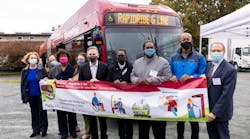King County Metro celebrates completion of construction on RapidRide G Line project
King County Metro has completed major construction on the RapidRide G Line project, the agency’s eighth RapidRide line. King County Metro hosted a ribbon-cutting ceremony in Capitol Hill, Wash., on Aug. 29 to pave the way for the start of service on Sept. 14. The new RapidRide G Line adds miles of red bus lanes, along with extensive upgrades and improvements to Madison Street.
“The RapidRide G Line is an essential addition to our expanding regional transit network," said King County Executive Dow Constantine. "Traveling along the Madison Street corridor, RapidRide G creates connections to multiple transportation options. You won’t need a car to get from the CID, First Hill or the Madison Valley to downtown Seattle, Link light rail, ferries, water taxis and more. The RapidRide G Line is a major step forward in reducing pollution and increasing opportunities for all.”
The RapidRide G Line will connect downtown Seattle with First Hill, Capitol Hill, Central District and Madison Valley, providing a vital link between these key areas and offering the highest quality bus service in the region. The redesigned Madison Street will help to improve safety around schools, small businesses, libraries and hospitals. The project also included sidewalk repairs, new walk and bike signals with rebuilt utilities.
“Seattle has many reasons to celebrate this robust new transit line and the wide array of safety, accessibility and connectivity improvements through some of our most vibrant neighborhoods,” said Seattle Mayor Bruce Harrell. “This project was made possible because of a strong team effort and I want to thank our federal, state and local partners for their investment and collaboration, as well as the neighbors and local small businesses who have supported increased transit service and endured construction. This upgrade and new six-minute service has been long anticipated for neighborhoods like the Central District, Capitol Hill, downtown and Madison Valley and will bring real benefits. Our focus is on making it easier and safer to get where you need to go and completing this project reflects our commitment to expanding and strengthening transit service throughout Seattle.”
The $144.3 million RapidRide G Line project was funded through a combination of $80.5 million in federal grants, with additional contributions coming from Sound Transit ($35.8 million), the Levy to Move Seattle ($19.7 million), King County Metro ($3.5 million), Washington State Department of Transportation grants ($2.5 million) and other city of Seattle transportation sources ($2.3 million). The federal grants included $59.9 million from the Federal Transit Administration’s Small Starts program and $10.9 million from President Joe Biden’s American Rescue Plan.
“The RapidRide network has become a critical economic and personal asset for millions of riders throughout the Puget Sound region," said Federal Transit Administration (FTA) Acting Administrator Veronica Vanterpool. “Adding this service to Madison Street will help connect families to each other, patients to healthcare, students to education and get everyone where they need to go faster, safer and more frequently. Thank you to everyone who made this investment a reality.”
The RapidRide G Line will offer frequent service with new 60-foot, five-door buses arriving every six minutes most of the day to ensure reliable and efficient travel. Dedicated bus lanes and faster boarding with center-running bus stations will reduce commute times and enhance ridership while new curb ramps, crosswalks and sidewalks improve accessibility. Additionally, the project also included significant infrastructure upgrades like replacing a 120-year-old water main to improve drainage and wastewater systems and upgrading street lighting and power distribution.
“The new RapidRide G Line will deliver frequent and reliable service across Madison Valley, Capitol Hill, the Central District, First Hill and downtown Seattle,” said King County Metro General Manager Michelle Allison. “This collaborative, regional effort serving some of Seattle’s oldest neighborhoods will improve lives, help local businesses and expand access to opportunity.”
Highlights of the project include:
- 21 new RapidRide bus stops
- Two upgraded bus stops
- Four new center-running bus stations
- Eight miles of new or replaced sidewalks
- One lane-miles of concrete streets
- Three lane-miles of new asphalt
- Four miles of new dedicated bus lanes
- Five new signals and 36 upgraded signals
- 108 newly planted trees




